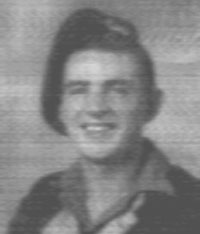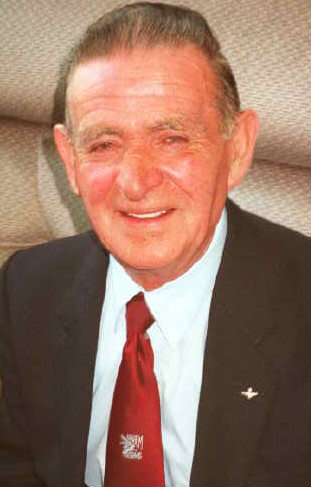Name: John Aitken
Rank: unknown
Unit: 7th (Galloway) Bn.
Regiment: Kings Own Scottish Borderers (KOSB)
 I enlisted into the Army in Edinburgh, the year
1941. After induction I was posted to Cameron Barracks Inverness for my basic training. My
first posting was to 7 KOSB at Kirkwall, in the Orkney Islands. The Battalion was part of
the Orkney and Shetland Defence Force, to be used on coastal defence duties. I remember
well, during this time and much to my embarrassment, that one of my tasks was to pick up
the mail from the mainland every morning. This entailed traveling by boat and every day on
this journey I was seasick, (much to the amusement of the children who made this same trip
every morning as well and were never sick!)
I enlisted into the Army in Edinburgh, the year
1941. After induction I was posted to Cameron Barracks Inverness for my basic training. My
first posting was to 7 KOSB at Kirkwall, in the Orkney Islands. The Battalion was part of
the Orkney and Shetland Defence Force, to be used on coastal defence duties. I remember
well, during this time and much to my embarrassment, that one of my tasks was to pick up
the mail from the mainland every morning. This entailed traveling by boat and every day on
this journey I was seasick, (much to the amusement of the children who made this same trip
every morning as well and were never sick!)
Life was to change quite dramatically though when we were relieved from this quiet, boring, remote post and sent south to Woodhall Spa in Lincolnshire. We were to become a glider borne unit in Airborne Forces. It was 1943, the 1st Airlanding Brigade had lost two Battalions to the newly formed 6th Airborne Division and we were to join 2nd South Staffords and 1st Border Regiments in the reformed three Battalion Brigade. We did our training on Salisbury Plain and I believe that was where we paraded to receive our 'Red Berets'. The training is all a bit sketchy now (50 odd years ago is a long time to remember) but I believe the initial glider training consisted of approximately 12 trips (26 men to a glider).
September 1944 and 'Operation Market Garden' was given the green light. We were ferried back and forward to the take off point about half a dozen times. (each time we were given a tot of rum). Then came the big day, I believe the airfield we left from was called Brize Norton. Shortly after crossing the coast, we came under enemy anti-aircraft fire. The 1st Air-landing Brigade were in the lead in the 'Air Armada'. The only Airborne troops before us were the men of the Independent Company whose job it was to mark the landing and dropping zones. We were earmarked to land on the northern landing zone, LZ-S. Our initial task, along with the rest of the Air-Landing Brigade, was the defence of the dropping and landing zones for the second lift due to arrive the following day, Monday. 7 KOSB was allocated the defence of DZ-Y, (Ginkel Heath) a task which left the companies exposed and separated from one another, as well as the rest of the Division, by thick woodland. We were also nearer the German forces who eventually assembled on this flank of the landing areas. The Battalion was to lose two officers and thirteen men in their attempt to keep the area clear of Germans during the second lift.
 When we finally cast off from our tug
aircraft we arrived on the LZ in a text book landing. We disembarked rather sharply and
saw some Germans running away from trenches which we immediately occupied. Almost straight
away we came under fire and were more or less pinned down in these trenches for the next
two days. During this period two of the lads in my trench were wounded by mortar fire,
(Privates J. Boyle and Willie Cant). The scenario of these and the following days is, and
always has been, very difficult for me to recall. This has obviously as much to do with
the passage of time as anything else. When we eventually left the trenches we made our way
to somewhere near Oosterbeek, taking up positions in (I believe it was a hotel or maybe a
hospital) We held out there till our ammunition finally ran out and we were taken
prisoner. I believe the whole exercise took between five or seven days, from landing to
capture. My first POW camp was Limburg, a make shift camp, fully tented but with no toilet
or washing facilities. We were there for approximately three months before moving on to
another camp, at Halle (near Dresden). Whilst there we were made to clear the rubble from
the bombed areas. This job we didn’t mind, as we occasionally came across a bombed
tobacconist shop. We took cigarettes, etc but on returning to the camp, we were searched
by the guards, who took most of the contraband back from us. They did allow us to keep a
little for ourselves though. They were mostly old men and some were missing the odd limb.
They really weren’t too bad at all though. One of the other, sadder, details that I
remember being placed on, was the burying of the children who were killed in the air
raids........a very sorrowful task!! We were on the move again, this time to a camp at
Nuremberg. I remember we marched most of the way, being strafed a couple of times by our
own aircraft, ( they obviously thought we were Germans). We remained there until we were
liberated by the 'Yanks'. Great Guys! they couldn’t do enough for us! I returned home
to a warm reception from the neighbours who thought I was some kind of hero - 'NUTS'. I
was then demobbed but have a lot to remember!
When we finally cast off from our tug
aircraft we arrived on the LZ in a text book landing. We disembarked rather sharply and
saw some Germans running away from trenches which we immediately occupied. Almost straight
away we came under fire and were more or less pinned down in these trenches for the next
two days. During this period two of the lads in my trench were wounded by mortar fire,
(Privates J. Boyle and Willie Cant). The scenario of these and the following days is, and
always has been, very difficult for me to recall. This has obviously as much to do with
the passage of time as anything else. When we eventually left the trenches we made our way
to somewhere near Oosterbeek, taking up positions in (I believe it was a hotel or maybe a
hospital) We held out there till our ammunition finally ran out and we were taken
prisoner. I believe the whole exercise took between five or seven days, from landing to
capture. My first POW camp was Limburg, a make shift camp, fully tented but with no toilet
or washing facilities. We were there for approximately three months before moving on to
another camp, at Halle (near Dresden). Whilst there we were made to clear the rubble from
the bombed areas. This job we didn’t mind, as we occasionally came across a bombed
tobacconist shop. We took cigarettes, etc but on returning to the camp, we were searched
by the guards, who took most of the contraband back from us. They did allow us to keep a
little for ourselves though. They were mostly old men and some were missing the odd limb.
They really weren’t too bad at all though. One of the other, sadder, details that I
remember being placed on, was the burying of the children who were killed in the air
raids........a very sorrowful task!! We were on the move again, this time to a camp at
Nuremberg. I remember we marched most of the way, being strafed a couple of times by our
own aircraft, ( they obviously thought we were Germans). We remained there until we were
liberated by the 'Yanks'. Great Guys! they couldn’t do enough for us! I returned home
to a warm reception from the neighbours who thought I was some kind of hero - 'NUTS'. I
was then demobbed but have a lot to remember!
My thoughts always go to all the lads who didn’t make it back, may they 'Rest In Peace'.


















